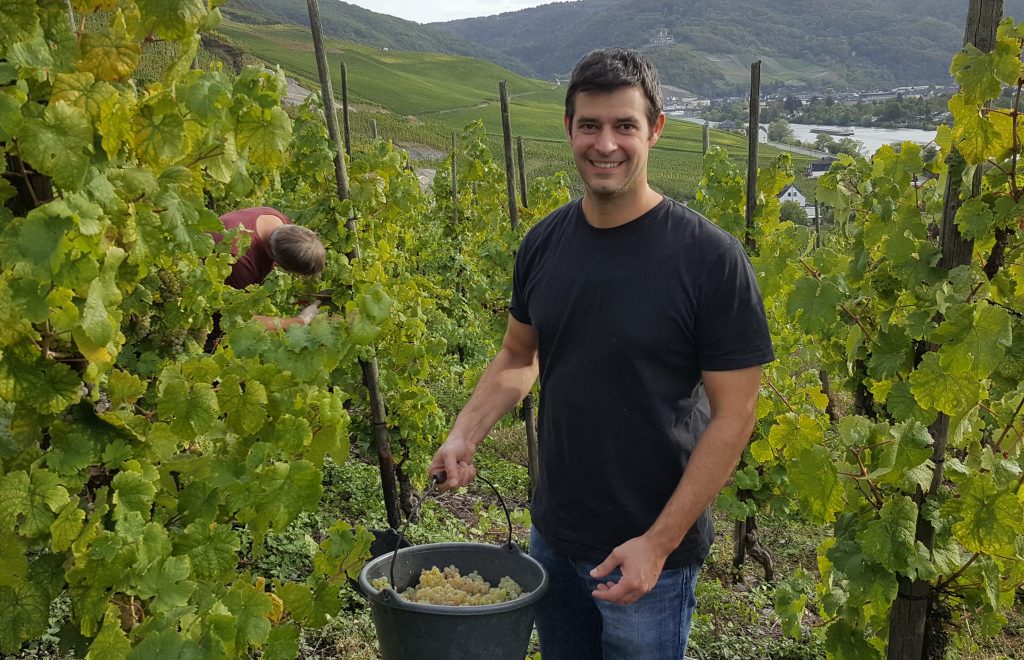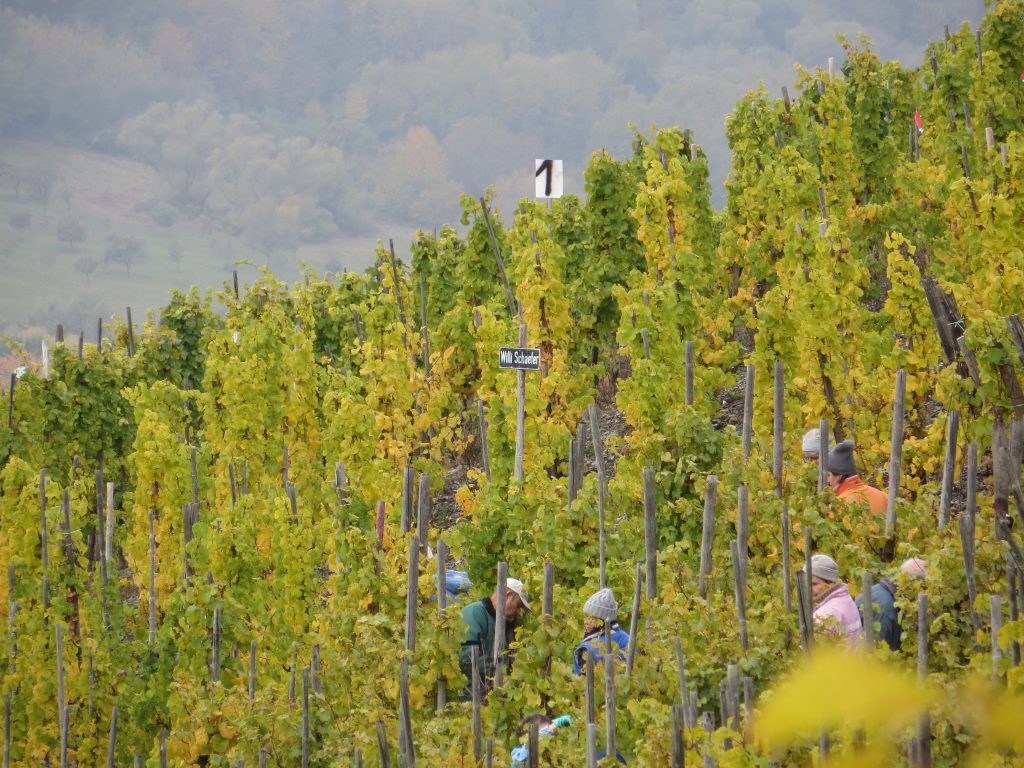23 Aprile 2020

Willi Schaefer: Knocking on Heaven’s Door
Nella maggior parte del mondo del vino sarebbe inconcepibile cercare di guadagnarsi da vivere, e fortunatamente bene, con soli quattro ettari di vigneto. Ma allora la maggior parte del mondo del vino non si trova lungo le sponde scoscese e pittoresche della Mosella e non cresce il Rheinriesling in vigneti che vantano appellativi sacri come Wehlener Sonnenuhr, Graacher Dompropst e Graacher Himmelreich – sì, Himmelreich, il Regno dei Cieli.
Il custode di questo paradiso terrestre è Weingut Willi Schaefer, un’azienda vinicola a conduzione familiare nel villaggio di Graach an der Mosel che affonda le sue
radici nel 1121 e che già nel 1590 era attivamente impegnata nella produzione di vino. Lo stesso Willli Schaefer è ancora attivo, anche se nel 2015 ha ceduto la conduzione dell’azienda al figlio Christoph e alla moglie Andrea, che si sono incontrati come studenti all’istituto vinicolo tedesco di Geisenheim e formano un team che continua a rafforzare la reputazione dell’azienda.
Come spiega Christoph, “Siamo e vogliamo rimanere una cantina di dimensioni artigianali. Produciamo Riesling esclusivamente perché la varietà è qualitativamente la più adatta ai terreni di ardesia devoniana dei nostri ripidi pendii con vitigni non innestati fino a cento anni. Lavoriamo in armonia con l’ambiente per sfruttare il potenziale di ogni singolo sito.

Prima della vendemmia, attraversiamo i vigneti e campiamo le uve in ogni appezzamento senza affidarci ostinatamente a dati misurabili, come l’Oechsle [una scala idrometrica che misura la densità del mosto d’uva] o l’acidità. Solo quando siamo completamente convinti che sia giunto il momento giusto, iniziamo la nostra vendemmia selettiva. Se si è personalmente soddisfatti del gusto dell’uva, allora anche il vino avrà un buon sapore”.
La fermentazione avviene con lieviti naturali provenienti dai vigneti principalmente in vecchie botti di Fuder da 1.000 litri. Come dice Christoph: “Durante la fermentazione, assaggiamo molto spesso per vedere quando l’equilibrio tra dolcezza e acidità e la struttura sono perfetti. Anche qui, inoltre, ci fidiamo delle nostre sensazioni e non dei valori numerici. Diamo ai Riesling il tempo necessario in cantina, un lungo contatto con i lieviti e l’imbottigliamento solo quando i vini sono pronti”.
Per un’azienda vinicola minuscola, Willi Schaefer produce un’impressionante gamma di vini, tutti i Riesling che vanno da tipi di Feinherb, Trocken, Kabinett e versioni monovitigno diWehlener Sonnenuhr, Graacher Dompropst e Graacher Himmelreich.
Tutte le etichette raffigurano un chierico medievale in piedi accanto a una botte di legno con uno stemma intagliato in modo elaborato che brandisce un calice con un sorriso soddisfatto. Tradizionale? Kitsch? Beh, qualunque cosa sia, funziona. Come si dice nel mondo del vino, non è tanto la confezione, quanto quello che c’è dentro la bottiglia che conta. E da Willi Schaefer quello che c’è dentro la bottiglia è – non c’è parola migliore per definirlo.
ENGLISH
Willi Schaefer: Knocking on Heaven’s Door
In most of the world of wine it would be inconceivable to try to make a living, and a blessedly good one at that, from just four hectares of vines. But then most of the world of wine doesn’t lie along the precipitously picturesque banks of the Mosel and grow Rheinriesling in vineyards boasting such hallowed appellatives as Wehlener Sonnenuhr, Graacher Dompropst and Graacher Himmelreich—that’s correct, Himmelreich, the Kingdom of Heaven.
The keeper of this earthly paradise is Weingut Willi Schaefer, a family winery at the village of Graach an der Mosel that traces its roots back to 1121 and was actively engaged in the production of wine as early as 1590. Willli Schaefer himself is still active, though in 2015 he handed over conduction of the winery to his son Christoph and wife Andrea, who met as students at Germany’s wine institute of Geisenheim and form a team that continues to enhance the winery’s reputation.
As Christoph explains, “We are and want to remain a winery of artisan dimensions. We produce Riesling exclusively because the variety is qualitatively the best suited to the Devonian slate soils of our steep slopes with ungrafted vines up to a hundred years old. We work in harmony with the environment to tap the potential of each individual site. Before the harvest, we go through the vineyards and sample the grapes in every plot without stubbornly relying on measurable data, such as the Oechsle [a hydrometer scale measuring the density of grape must] or acidity. Only when we’re completely convinced that it’s time do we begin our selective harvest. If you’re personally satisfied with the taste of the grapes, then the wine will taste good, too.”
Fermentation takes place with natural yeasts from the vineyards mainly in old 1,000-liter Fuder casks. As Christoph says, “During fermentation, we sample very often to see when the balance between sweetness and acidity and the structure are perfect. Here, also, we trust our feelings and not numerical values. We give the Rieslings the time in the cellar they need, long contact with the lees and bottling only when the wines are ready.”
For a minuscule winery, Willi Schaefer produces a striking array of wines, all Rieslings ranging through types of Feinherb, Trocken, Kabinett and single vineyard versions ofWehlener Sonnenuhr, Graacher Dompropst and Graacher Himmelreich.
All labels depict a medieval cleric standing beside a wooden barrel with an elaborately carved coat of arms wielding a chalice with a satisfied smile. Traditional? Kitsch? Well, whatever, it works. As they say in the world of wine, it’s not so much the package as what’s inside the bottle that counts. And from Willi Schaefer what’s inside the bottle is—there’s no better word for it—simply divine.
In last year’s awards for “The hundred best winemakers and wines of Italy” selected for Corriere della Sera by Luciano Ferraro and Luca Gardini, Willi Schaefer was honored as “the best international producer of wine.”